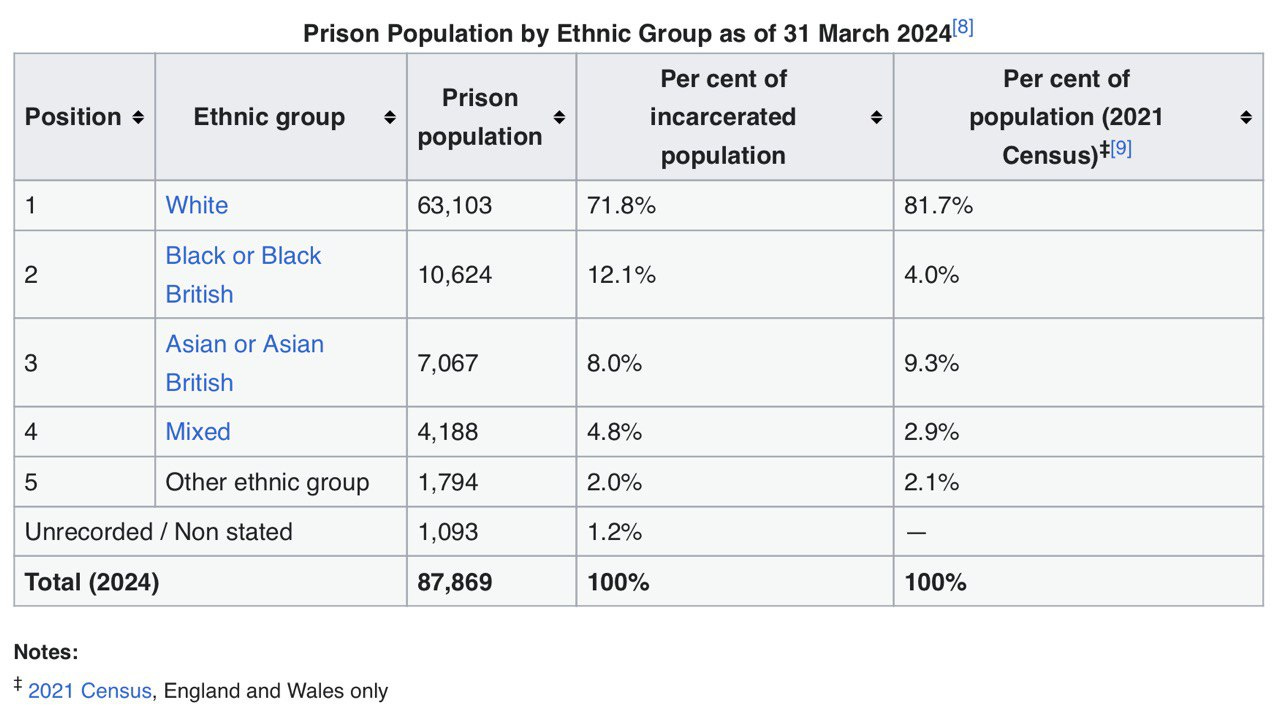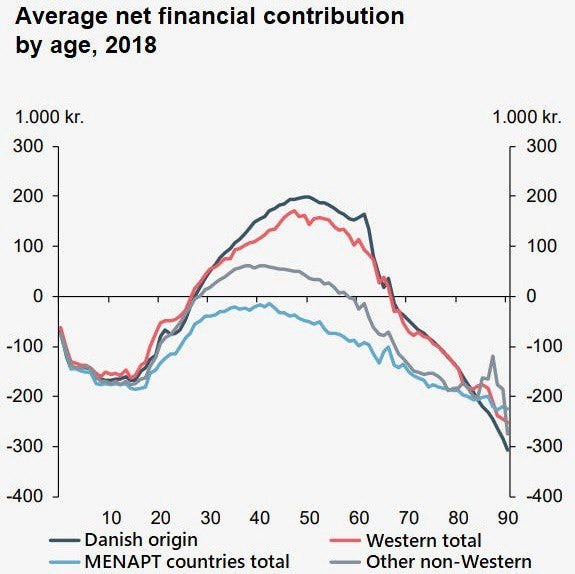Migration and Legitimacy
Opinion enforcement as class project
In my previous post on UK riots and migration, I did not cover the issue of crime. Neither the murderous stabbing of the girls in Southport that was the trigger for protests and riots nor the wider issue of crime and migrants in the UK.
In the UK, various migrant communities have a noticeably higher rate of criminality than the locals. This is not the general pattern with migrants in Anglo-settler countries like Canada, US, Australia, New Zealand. There, generally, migrants display a lower rate of criminality than the residents.
There can be some complexities: if an influx of new people lower in social trust arrives—impeding effective policing, for example. Some migrant cohorts then do have higher crime rates than the locals. Nevertheless, the dominant pattern is that migrants have a lower level of criminality than the locals.
The contrast with the UK is particularly stark regarding Asian-Brits as compared to Asian-Americans and Asian-Australians. The latter two groups are noted for their lower levels of criminal behaviour. Again, there are some differences between countries of origin, but the general pattern is quite clear.
In the UK, we see a very different pattern. Asian-Brits have a higher rate of criminality than the locals. Nor is there any mystery about why this is so. The issue is not East Asians or South Asians, who display the same patterns of notably lower criminality one sees in such migrants elsewhere.
The differences are with Middle Eastern and Pakistani Muslims who—in Britain as elsewhere in Europe—display a higher rate of criminality than the locals. One of the factors that makes them, as a group, a drain on the fisc of the countries receiving them.
That British migrants in general display a higher level of criminality than the locals is a strong signal that the UK has been bad at selecting migrants.
The British media made a point of labelling the son of Rwandan migrants who has been charged with the stabbings a choirboy, thereby identifying his religion. The contrast with the way mainstream media typically avoids drawing attention to the religion of Muslim perpetrators is striking.
It is even more striking in cases where religion is a factor both in perpetrating and coordinating crimes, as in the “grooming gang” cases. Those have been regularly referred to as “Asian grooming gangs”, thereby slandering British Sikhs, Hindus, Buddhists and Christians, who have had nothing to do with such gangs.
Worse, some of the perpetrators have been Somalis and other North Africans, who are not Asians but are, of course, Muslims. The “grooming gangs” are overwhelmingly Muslim gangs, behaving according to the same cultural scripts and religious doctrines that led to the systematic rape of Yazidi girls under ISIS. There is a reason British working-class anger has been particularly pronounced in Rotherham.
The logic of belief is not necessarily the logic of believers, but believers are more likely to commit to belief-based cultural scripts (i.e. patterns of action). Salafi mosques tend to generate both jihadis and rape gangs as they generate the requisite sense of Allah-granted entitlement to impose and express Muslim dominion over kaffir—non-believers—by violence, whether homicidal or sexual.
To notice any of this is, of course, to be “Islamophobic”. Control over legitimacy in discourse—so controlling acceptable opinion—is demonstrably much more important to the Anywhere (folk whose networks are not based in a particular locality) graduates who dominate the media and other epistemic industries—IT, entertainment, academe, schooling—than rape and sexual exploitation of literally thousands of working class British girls by scores of overwhelmingly Muslim men.
Just as such control of legitimacy and opinion—dressed as moral concern—is clearly also much more important than raped Muslim daughters.
Opinion enforcement
The enthusiasm with which much of the mainstream UK media—particularly the BBC—is all in on opinion enforcement regarding the country’s recent riots has been striking.
The contrast with the reaction to the BLM riots, or those in 2011, is even more striking. Let us be clear here, the BLM cause was bullshit—something propounded for rhetorical effect without regard to the truth—all the way down. Police killing of unarmed African-American menis a very minor phenomenon in the US then inflamed by systematically inaccurate mainstream media reporting. The BLM cause was even more of a nonsense in the UK, with its unarmed police.
Media reporting of both the BLM protests and riots and the recent anti-immigrant protests and riots both followed the Pravda media model: pushing approved narratives to which one must accede to be a good person. That is how control of legitimacy, and so acceptable opinion, works. This is especially so when coupled with the de-legitimisation—and so the shaming and shunning—of dissenters.
When a serious scholarly study showed what bullshit the BLM cause was, the author was pilloried and prosecuted. Controlling legitimacy via a shared status game—to generate social leverage—required narrative protection.
The mass outbreak of anti-police activism due to promulgation of bullshit media narratives in the US (and elsewhere) was predictable and predicted. Police withdrew from policing African-American localities, leading to a surge in homicides. Thousands of overwhelmingly African-American young men died violently as a knock-on consequence of moral giants at the New York Times, Washington Post and elsewhere parading their virtue, and offering that same sense of virtue to readers who bought into bullshit narratives.
BLM rioters were not labelled “far left thugs”. The apparatus of the state did not swing into action to try to block expressing opinion supportive of BLM or of individual rioters’ grievances. Instead, they became “mostly peaceful protests”.
The BLM activism and protests formed part of wider social eco-system of non-profits that grifts off lies and failure and punishes those who get in the way of grifts. “Minority” academics gain status, social leverage, and career advancement from their confreres doing notoriously less well than others. It is very much in their interest to maintain—and so police—narratives of oppression and imposed disadvantage.
The anti-migration protests and riots in the UK have been about the same level of “mostly peaceful” as the BLM protests and riots except—unlike in BLM riots in the US—no one died.
During the 2011 riots, while the Tory-Lib Dem Coalition Government was strong on law and order in response, left-progressive commentary stressed the problem of underlying causes and grievances.
With modern progressivism, if there is a choice between (1) showing concern for the inconveniently marginal or (2) concern for truth or (3) maintaining control of legitimacy, and so enforcing acceptable opinion, Anywhere progressives can be relied upon to go for the last at the expense of the former.
The 2011 rioters were “persons of colour”, so were entitled to legitimate grievances, even if violently expressed. The BLM rioters were either a sacred group (African-Americans, Afro-Brits) or middle class university graduates. They therefore got group and class passes in their “mostly peaceful” protests. Moreover, both sets of protests and riots were the “right side of history”, no matter how spurious was BLM’s cause. They fitted in with left-progressivism’s religion of progress.
The July-August 2024 UK rioters are overwhelmingly native working class Brits reacting against the sacred cause of ever more migration. Hence, they get the full force of class contempt and opinion de-legitimisation by state and media.
There has been a persistent pattern of riots and disturbances involving “people of colour” or approved causes being bracketed by reaching out to “community leaders”. The contrast with the repression and delegitimisation of the protests against various public policy responses to Covid and the recent anti-immigration riots is stark.
Complaining about the—often quite blatant—hypocrisy of left-progressives has been a staple of conservative commentary for decades. But such commentary often misses the point. The embrace of hypocrisy and falsehood by left-progressives is functional.
First, it sorts for loyalty: if you go along, you show yourself a member of the moral in-group. If you baulk, you are not One Of Them, and can be ejected.
Second, it expresses social power. The ability to impose blatant double standards and (increasingly bizarre) falsehoods as acceptable opinion both exercises and displays their social power. That Weimar Germany had hate speech laws under which prominent Nazis were regularly prosecuted—and then used such prosecutions to broadcast their cause and parade as martyrs—is irrelevant. The point is not to be effective, the point is to assert social dominance.
Institutional dynamics
There are several things going on at once here. One is the increasing institutional dominance of left-progressivism. As left-progressivism is dominated by university graduates and makes an imagined future its moral and analytical benchmark—so judges evidence through the lens of Theory—it is prone to seek social leverage through controlling legitimacy and well able to generate claims that sort folk into the moral in-group and the out-group.
Another is the feminisation of institutions—and so of discourse. Hence the elevation of emotional convenience and comfort over inconvenient facts. Bad-feels facts are de-legitimised: only those claims that protect the emotions of the Virtuous become acceptable. This opinion sorting is enforced by “trashing”, by shaming and shunning.
Such feminisation also leads to loss of social solidarity. Women are much less likely to have close friends of lower socio-economic status than men, as such women are not worth the emotional investment female friendships typically involve. Men, meanwhile, never know when they might want such folk on their team. The silence over the victims of the “grooming gangs” by people who can go from zero to outrage in 280 characters has been striking. Control of legitimacy—giving them status and social leverage—clearly matters far more to them than what happens to their socially inferior “sisters”.
Feminisation of institutions also leads to increasing institutional cowardice, as the physically weaker sex seeks safety in emotional conformity. The dominance of feminist perspectives in approved opinion aids the delegitimisation of existing history and cultural heritage as it is overwhelmingly male, so patriarchal. Such de-legitimisation means that migrants become a favoured category over the locals: especially working class locals. This despite the fact that East Asian, Indian and Muslim migrants come from societies that are, and have been, far, far more patriarchal than Western civilisation.
The corrosion of British police by an internal “snitching” culture also undermines the black humour that (male) teams use to build trust. Such talk tests whether folk can bear a bit of pressure—whether they will continue to support their team member even if they say outrageous things. Instead, we’ve created a police culture that grades disturbances by the identity of the perpetrators and extends to the wider citizenry opinion enforcement mechanisms police experience internally and impose on each other.
Another dynamic is increasingly pervasive managerialist bureaucratisation. In a welfare state, the bureaucracy—whether state, non-profit or corporate—expands via the colonisation of social pathologies, creating deeply perverse incentives. To the extent that maintaining—or even expanding—social pathologies becomes a boon to such institutions. Hence immigration that is against the interests of the wider society can be very much in the interest of such bureaucracies.
Managerialist bureaucracies also benefit from the undermining of democracy, as that greatly reduces accountability pressures.
A 2015 literature review notes that:
Nannicini et al. (2013) show that in localities with a higher level of social capital, citizens are more likely to hold politicians accountable for the aggregate social welfare of the community.
So, it is in the interests of political elites—and even more managerialist-bureaucratic elites—to degrade local social capital. By, for example, flooding working-class communities with migrants with very different cultural values and then playing the groups off against each other.
Critical Social Justice—aka “wokery”—is not merely structured for the non-electoral politics of institutional capture, it is the active celebration of such. Once bureaucracies embrace moral aims such as “equity”, a series of invidious consequences follow. First, it undermines accountability, as managerialist-bureaucratic actions get judged by their declared intentions, not their consequences, and bureaucrats can mobilise the activists’ fallacy on their own behalf:
We are doing X to achieve Y.
You are against X.
Therefore,
You are against Y.
Secondly, government that seeks to “do good” becomes unlimited in ambit, as there is always more good to be done. Thirdly, it feeds managerialist-bureaucratic arrogance, as they become a moral elite shepherding society. The general citizenry become full of morally lesser beings whose perverse choices have to be blocked in the name of higher morality, even if such choices are expressed at the ballot box.
This is supported by various academic commentary. For example, having rational concern for preserving one’s local connections—one’s social capital—being transmuted into nasty racism or xenophobia via, for example, the concept of “compositional amenity”: a classic example of using Theory to frame evidence.
Feminisation increases the tendency to use social media to mob folk, to shame dissent, while increasing pressure to protect feelings. Managerialist-bureaucratisation favours fracturing the demos and undermining democratic accountability. Left-progressivism is well set up for seeking social leverage and institutional dominance through command of legitimacy.
Unless there are strong democratic pressures to the contrary, all the above will tend to encourage dysfunctional migration policies that use mass migration as a weapon against the local working class and delegitimise dissent against such. We can see these patterns operating in Britain in deeply dysfunctional ways.
As James Lindsay notes, we can tell that socialism is a religious belief, as socialism never fails, folk fail socialism. We see the same with Critical Social Justice: social justice never fails, folk fail social justice. Migration never fails, people fail migration.
The failure of such fantasy Theory leads to three responses: more Theory, opinion suppression and purges. “Far-right” as thought-terminating cliche is a good use for bullshit Theory. The activation of online censorship represents opinion suppression. The activation of cancel culture represents purges.
The reality is that the British approach to migration has failed, is failing and will continue to fail as being anything other than a weapon used by an increasingly stupid-through-arrogance British elite against its own working class.
The question becomes: can the British elite sustain the level of suppression of its own working class required to continue to impose its deeply dysfunctional approach to migration on them? This question does not matter only to Britain, but has become particularly sharp in the country that gave us soccer hooligans.
References
Alberto Alesina and Paola Giuliano, ‘Culture and Institutions,’ Journal of Economic Literature, 2015, 53(4), 898–944.
Ayaan Hirsi Ali, Prey: Immigration, Islam, and the Erosion of Women’s Rights, HarperCollins, 2021.
Jan van de Beek, Hans Roodenburg, Joop Hartog, & Gerrit Kreffer, ‘Borderless Welfare State: The Consequences of Immigration on Public Finances [Grenzeloze verzorgingsstaat: De gevolgen van immigratie voor de overheidsfinanciën],’ University of Amsterdam, Amsterdam School of Economics, 2021.
Joyce F. Benenson, Henry Markovits, Caitlin Fitzgerald, Diana Geoffroy, Julianne Flemming, Sonya M. Kahlenberg and Richard W. Wrangham, ‘Males' Greater Tolerance of Same-Sex Peers,’ Psychological Science 2009 20: 184-190.
David Card, Christian Dustmann and Ian Preston, ‘Immigration, Wages, and Compositional Amenities,’ Norface Migration Discussion Paper No. 2012-13, February 2012.
Roger Eatwell and Matthew Goodwin, National Populism: The Revolt Against Liberal Democracy, Pelican, 2018.
Jo Freeman, ‘Trashing: The Dark Side of Sisterhood,’ Ms magazine, April 1976, pp. 49-51, 92-98.
https://www.jofreeman.com/joreen/trashing.htm
David Goodhart, The Road to Somewhere: The New Tribes Shaping British Politics, Penguin, 2017.
Mark Granovetter, ‘The Strength of Weak Ties: A Network Theory Revisited,’ Sociological Theory, Vol.1, 1983, 201-233.
Garett Jones, The Culture Transplant: How Migrants Make the Economies They Move To a Lot Like the Ones They Left, Stanford University Press, 2023.
Peter McLoughlin, Easy Meat: Inside Britain’s Grooming Gang Scandal, New English Review Press, 2016.
Fleming Rose, ‘Words and deeds,’ Index on Censorship, (2012) 41(1), 55-62.








Another brilliant article explaining the how’s and why’s of our current situation. I wish I would have understood this in my 20’s rather than my 50’s, it could have saved me a lot of grief. You always elevate the conversation to the very best in critical analysis, there are very few people like the two of you around, and if they are, they seem to always choose the dark side? Thanks for everything you do, it keeps my hope alive!
It's a valid argument, but your data is skewed. The Home Office and CPS between them have been moving Heaven and Earth to make per population group grooming stats look similar in terms of prison populations. One problem is that most Muslim group paedophiles don't get charged or tried. Telford is probably the most extreme example- of over 200 men with at least three former girls all willing to testify against them, only seven men were ultimately tried and imprisoned.
The best data comes from an inquiry by the Office of the Children's Commissioner in 2012. It found 36 per cent of victims of group or gang child abuse identified their attackers as white, 27 per cent as Asian, 16 per cent as black, with 16 per cent unspecified. This is similar to the findings of the 2020 Home Office report- it showed White offenders were somewhat more common (not surprising given Whites are 80% of the population), but that Asians were 'overrepresented'. That's an understatement, given relative population sizes.
All your article proves is that a two-tier justice system was in effect long before the UK riots.
https://www.independent.co.uk/news/uk/home-news/quilliam-grooming-gangs-report-asian-abuse-rotherham-rochdale-newcastle-a8101941.html
https://geary.substack.com/p/tinderbox-how-the-british-government/comments